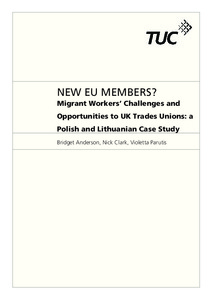New EU Members ? Migrant workers' challenges and opportunities to UK trade unions: a Polish and Lithuanian case study
"On 1 May 2004 ten new states joined the European Union. Citizens of these states were permitted to work without visas in the UK, resulting in a large increase in the numbers of migrant workers. This study, based on a mail survey of 508 Polish and Lithuanians who requested a TUC leaflet on thei...
| Main Authors: | , , |
|---|---|
| Institution: | ETUI-European Trade Union Institute |
| Format: | TEXT |
| Language: | English |
| Published: |
London
2007
TUC |
| Subjects: | |
| Online Access: | https://www.labourline.org/KENTIKA-19292223124910104059-New-eu-Members-?-Migrant-worke.htm |
| Summary: | "On 1 May 2004 ten new states joined the European Union. Citizens of these states were permitted to work without visas in the UK, resulting in a large increase in the numbers of migrant workers. This study, based on a mail survey of 508 Polish and Lithuanians who requested a TUC leaflet on their rights, explores the kinds of difficulties faced by this group of migrants, and the challenges and opportunities for organising them.
These are the key conclusions of this research. Many Eastern European migrant workers face exploitation in Britain:
o over half said that they had encountered problems at work in the UK either in the past or currently;
o nearly a quarter reported having no written contract, a figure which rose to nearly a third amongst agency workers;
o over a quarter had problems with payment, including not being paid for hours worked, discrepancies between pay and payslips, unauthorised deductions, and errors in pay calculation; and
o ten times as many migrants as indigenous workers were paid less than the National Minimum Wage 1…." |
|---|---|
| Physical Description: | 27 p. Digital |

